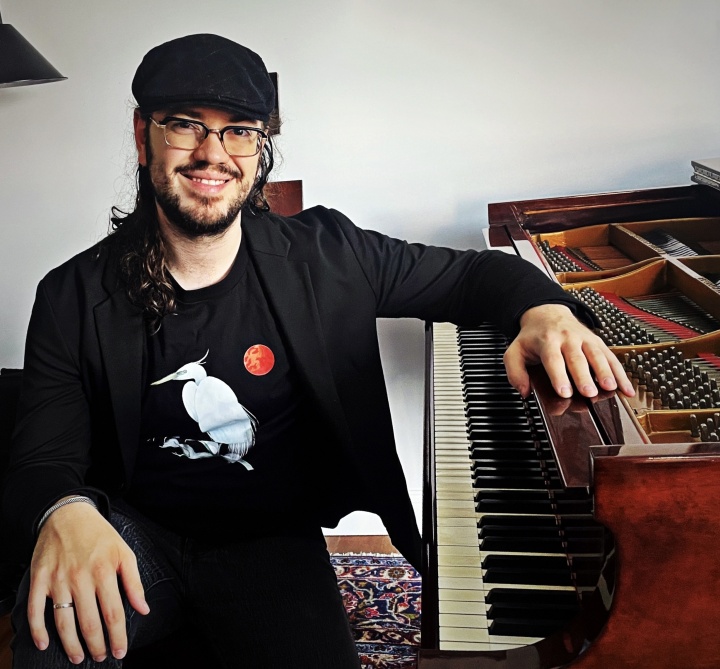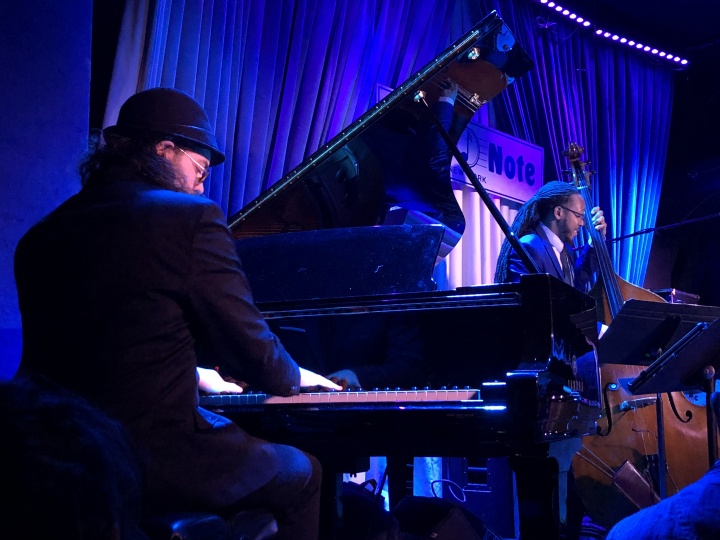Ben Rosenblum ’16 explores the many permutations of global music traditions.
Columbia College | Columbia University in the City of New York
Ben Rosenblum ’16 explores the many permutations of global music traditions.

Ben Rosenblum ’16
YOKO SANO
“The next day Ben ran his hand across the curved side and said, very softly ... beautiful,” recalls his mother, Monique Witt. “Then he toddled up to the bench, scooched himself on, began touching the keys, found the octave and began expanding it harmonically.” She knew right away, she says, that her 2-year-old was a music prodigy.
She was right. At 6, not long after starting piano lessons, Rosenblum was flawlessly playing Bach two-part inventions, often with his Beanie Baby perched nearby. Sometimes he would hum improvised melodies, saying it was the music in his head. “I never really loved practicing classical piano,” he says, “but I loved sitting down and just playing and finding my way through. I guess it was what one might call free improvisation, but I didn’t know it as that. I just liked to find melodies and kind of explore.” He was already a jazzman at heart.
YOKO SANO
The family Steinway now sits in Rosenblum’s living room on La Salle Street, about halfway between Columbia’s Morningside and Manhattanville campuses. He loves it now just as he did at first sight. “I think anything from childhood shapes the way one hears music,” he says. “When I play my own piano, it feels effortless to translate what I hear into the instrument.”
There’s nothing like home cooking.
Although Rosenblum’s older brother, Dev, graduated from Harvard, as did their father and grandfather, Ben turned down its offer of admission, largely because his chosen career was already under way in New York. During a gap year before starting in Columbia College’s joint program with Juilliard, he was already gigging professionally with established players in New York clubs and restaurants, among them the late, lamented Abbey Pub on West 105th Street.
At Juilliard Rosenblum was able to study with world-class jazz pianists like Kenny Barron and Frank Kimbrough; meanwhile, at the College, he worked closely with Professor Chris Washburne, who founded Columbia’s Louis Armstrong Jazz Performance Program and now chairs the University’s music department. Washburne is a standout trombonist and Latin jazz bandleader as well as an educator. He spotted Rosenblum’s talent immediately, and has collaborated with him in a variety of settings ever since.
“Ben is an extraordinary person, and that comes out in his music,” Washburne says. “He’s very empathic, he’s very thoughtful, he’s very intellectually engaged. But his music is also emotionally engaged. So I think that’s what makes him so compelling. And he’s continually growing.”
Under the College’s auspices, Rosenblum formed Jazz House, a jazz advocacy housing group, in River Hall. His peers included budding talents like pianist Jeremy Corren ’17 and vibraphonist Jake Chapman ’16. “They would put on presentations for fellow students and host jam sessions, and they made it a really cool thing. I was very proud of them when they pulled that off,” Washburne recalls.

Rosenblum at the keys at the Blue Note.
There were practical skills to be learned. “As a pianist, for example, you must know how to accompany a singer without getting in their way, to play sensitively and follow them. You need to be very good listener. If the singer came in on the bridge instead of at the beginning of the song, you need to know the songs well enough to make instant adjustments. In a city like New York there are hundreds if not thousands of people on every instrument, and you could get replaced in a moment.”
Rosenblum also honed his scholarly chops at the College. He majored in philosophy and, as a senior, took on an independent study project with classicist Katharina Volk, delving into Stoic and early Christian philosophers. The readings were in Latin. “I love Latin,” he says.
Another class that stood out for him was Japanese history with David Lurie GSAS’01, Rosenblum says. He met his wife, Yoko Sano, a visual artist, during one of his tours of Japan; they married in 2022. “I’m three years deep into studying the Japanese language. Having a basic understanding of the culture and history from that Columbia class has been very important in my life.”
During his senior year, a jazz vocalist friend mentioned she was looking for someone to play accordion in her band. Though he’d only dabbled in the instrument, Rosenblum took the opportunity, developing his skills over six months of regular Thursday night gigs. Along the way, he says, “I started taking lessons with an amazing Brazilian accordionist, Vitor Gonçalves, and fell in love with the Brazilian accordion tradition — not just samba, but also forró, which is very accordion-centric, and choro.”
The piano and the accordion offer very different expressive possibilities, Rosenblum says.
“If you think about the fundamental roots of music, it is in drums and voice. So the piano for me is my drum — it is technically a percussion instrument, as the hammers strike the strings — and the accordion is my voice. Like a saxophone, it creates sound by wind passing through the reeds, so it breathes just like a voice does.
“Because of that, I feel like I get a full range of expression,” he adds. “This allows for a lot of unique combinations, especially when arranging with other instruments in mind. The blends are beautiful, and, in my opinion, underexplored.”
Thanks to his accordion playing, Rosenblum’s breadth of experience is now global. In addition to jazz and Brazilian music, he has studied or worked with flamenco artists, klezmer bands and groups representing the musical traditions of Ireland, Argentina, Cuba, Peru, the Middle East, the Balkans, India, Japan and the Caribbean, among others.
“Through these musical encounters, I’ve met so many incredible people all over the world,” Rosenblum says with undisguised pleasure. “It’s really very humbling and very exciting for me. And every day — every day — I get to do it.”
Former CCT editor Jamie Katz ’72, BUS’80 has also held senior editorial positions at People, Vibe and Latina magazines and contributes to Smithsonian Magazine and other publications. A former jazz director of WKCR, he is currently working with public radio producer Aaron Cohen on the fourth season of the award-winning podcast Embrace Everything: The World of Gustav Mahler. Katz profiled composer Ellen Reid ’05 for the Fall 2024 CCT feature, “A Whirlwind of Creativity.”

Published three times a year by Columbia College for alumni, students, faculty, parents and friends.
Columbia Alumni Center
622 W. 113th St., MC 4530, 6th Fl.
New York, NY 10025
212-851-7852
cct@columbia.edu

Columbia Alumni Center
622 W. 113th St., MC 4530, 4th Fl.
New York, NY 10025
212-851-7488
ccalumni@columbia.edu